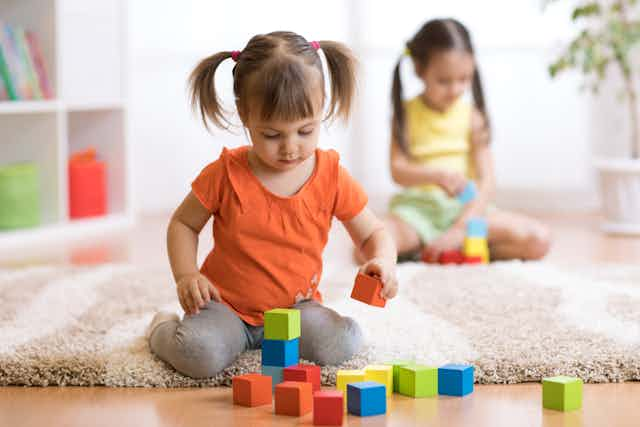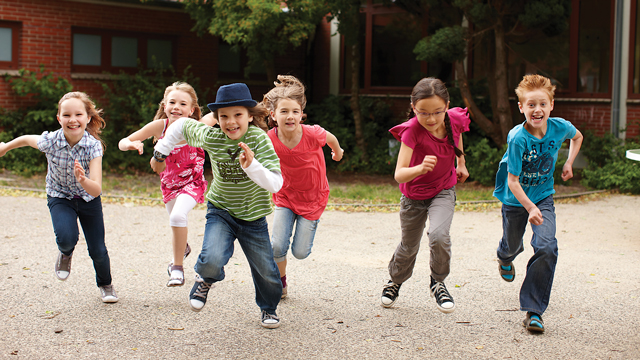You are at the grocery store and you hear a father talking calmly and quietly to his screeching, crying four-year-old daughter. You quietly observe as he tells her that they can’t buy the toy she wants because they don’t have money for it right now. She continues to scream that this is what she wants and she’s not going to stop until she gets it. You watch the frustration and pain on this man’s face as he puts her in the cart and continues to walk towards the dairy section of the store. You may encounter other people casting judgements towards him for not getting his daughter to stop.
Have you ever overheard another person say “Oh my child is just so easy!”, “My child doesn’t have those issues.”, or “Why don’t you try this with your child?”. And then you are left sitting there shaking your head processing what they said? Well, this happens far to often and is often seen as a parent is struggling with a child, like the scenario above. Steinberg (2005) says “Don’t try to fight your child’s temperament. If you work with it, rather than against it, you’ll both be a lot happier.”
 |
| Yours, Mine, & Ours (1968)-no one child is the same. |
Looking at development, there are different things to look at. According to Raising Children Network, when a child is developing, they go through a series of changes- “physical, social, emotional, behavior, thinking, and communication skills. Each of these areas of development are linked, and each depends on and influences the others.” Every age group has certain milestones that are expected to be hit, but don’t be alarmed when your 2nd child or any children you do have, don’t hit these milestones at the same age as their siblings or in the same manner as them either. To reiterate Steinberg, your child is unique and they are growing and learning at their own individual pace. Do not worry when your child is behind where another child is.
What are the developmental ages called and what can I expect during these?
According to Children’s Hospital of Orange County, the different age groups are newborns, infants, toddlers, preschool, school age, and adolescence.
Newborns are considered to be from birth until about 2 months. Newborns will typically gain about an ounce a day after the first two weeks, but there are also many factors that determine a newborn’s physical growth. Some of those factors include if they were a multiple (twin, triplet, or other multiple), having larger or smaller parents, if they are the first (first babies sometimes are smaller than their younger siblings born later), mom’s health and nutrition during pregnancy, and the baby’s own health concerns. Newborn’s have a number of unique refluxes but also have a number of physical characteristics and behaviors. Newborns will typically get 14-17 hours of sleep a day, but shouldn’t sleep any longer than 5 hours at a time during the first 6 weeks because they need to eat. Breastfed babies often eat between 2-3 hours, where as bottle fed babies tend to eat every 3-4 hours.
A child is considered an infant until they are one year old. In early infancy, babies gain around 1-2 pounds each month, but as they get bigger and reach their first birthday, they gain about 13 ounces. During infancy, babies begin to support themselves-from being able to roll over, sit up on their own, pull themselves up onto and cruise around furniture. You can start to introduce your child to new foods like fruits and vegetables, but only introduce one at a time and wait to try a new food for about 5 days, to make sure your baby doesn’t have allergies. It is recommended to NOT give your baby honey or cow’s milk until after their first birthday. Honey can cause botulism (toxin that attacks the body’s nerves) and cow’s milk doesn’t have the nutrition that your baby needs from breast milk or formula.
 |
| Toddlers learn about stacking. |
Preschoolers are ages 4-5 and are learning so many new things during these ages. It is during this age that they begin to recognize their name-both being said and when it is spelled out. They also recognize colors around them, are able to recite the ABC’s and are able to play simple games with family and friends. During this age, they become very independent, wanting to do everything for themselves, they appear to be moody, but they also start to learn about manners.
 |
| Finding good friends is important at this stage of life. |
Adolescence is ages 13-18 and these youth are experiencing so many different things. A majority of them are hitting puberty-which involves an influx of hormones, body changes, and feelings, but this usually happens one thing at a time-not all at once. They begin to develop an independence from their parents and tend to spend more time with friends. Many teenagers participate in extracurricular activities.
REMINDER
It is okay if your child doesn’t milestones or they don’t develop at the same speed as your other children or like children around them. Keep an eye on your child and document the things that you are seeing and work with them at their pace. When you do have concerns, talk with your pediatrician or family doctor-they are qualified to help you with your concerns and make sure your child has the same opportunities as other kids. All in all-help your child to know that you LOVE them!
ReferencesBluey- Official Channel. (2022). It's a Baby Race | Full Episode Season
2 | Bluey. In Youtube. https://www.youtube.com/watch?v=xmkCmJtK6X8
CHOC. (2021, June). Child Development: Ages and Stages - CHOC Children's. CHOC Children's; Children's Hospital Orange County. https://www.choc.org/primary-care/ages-stages/
Help Me Grow MN. (2020). Helpmegrowmn.org. https://helpmegrowmn.org/HMG/DevelopMilestone/index.html
Raising Children Network. (2018). Child development: the first five years. Raising Children Network. https://raisingchildren.net.au/newborns/development/understanding-development/dvelopment-first-five-years
Steinberg, L. D. (2005). The ten basic principles of good parenting. Simon ans Schuster Paperbacks. 4th Principle.


No comments:
Post a Comment